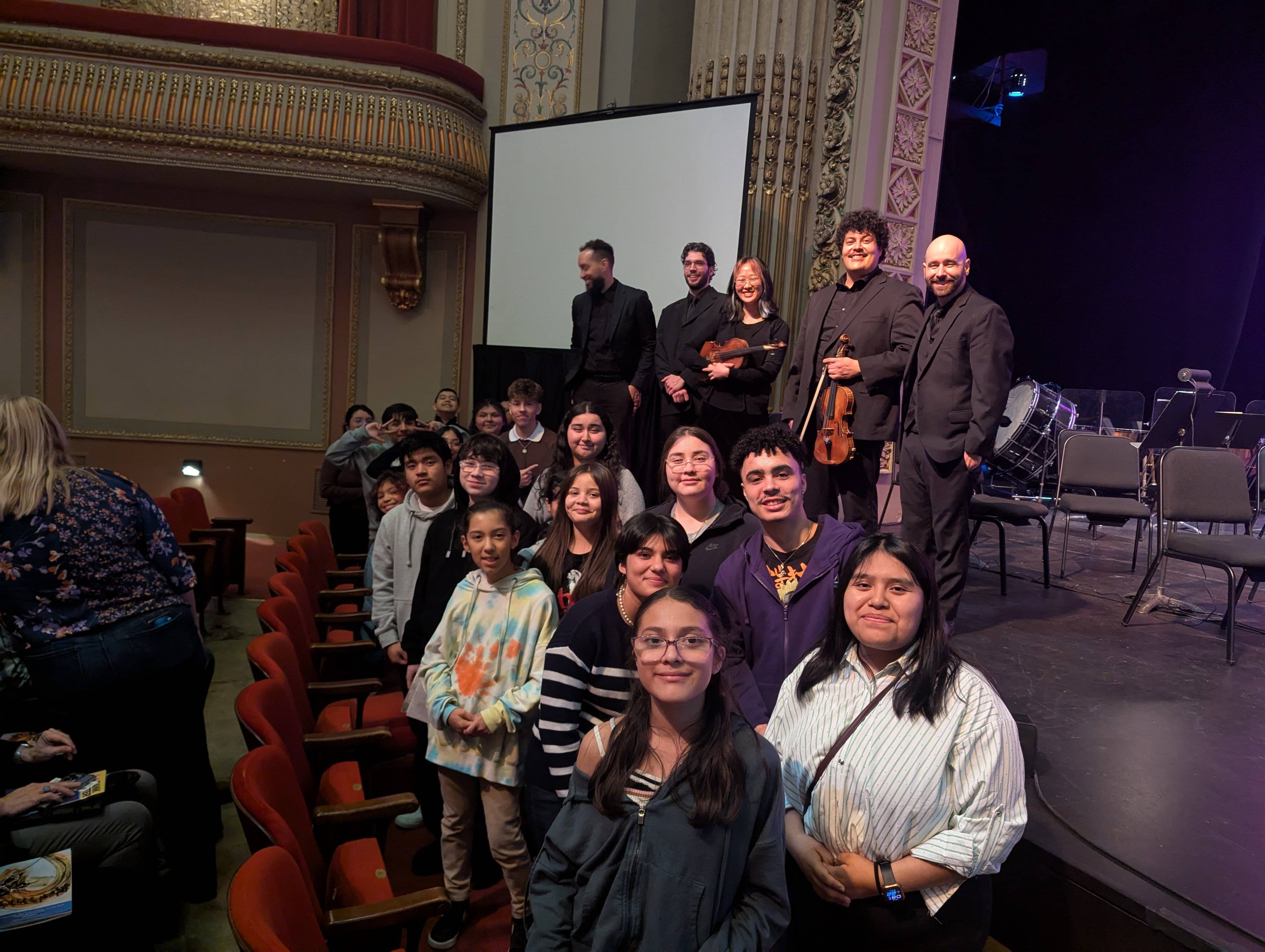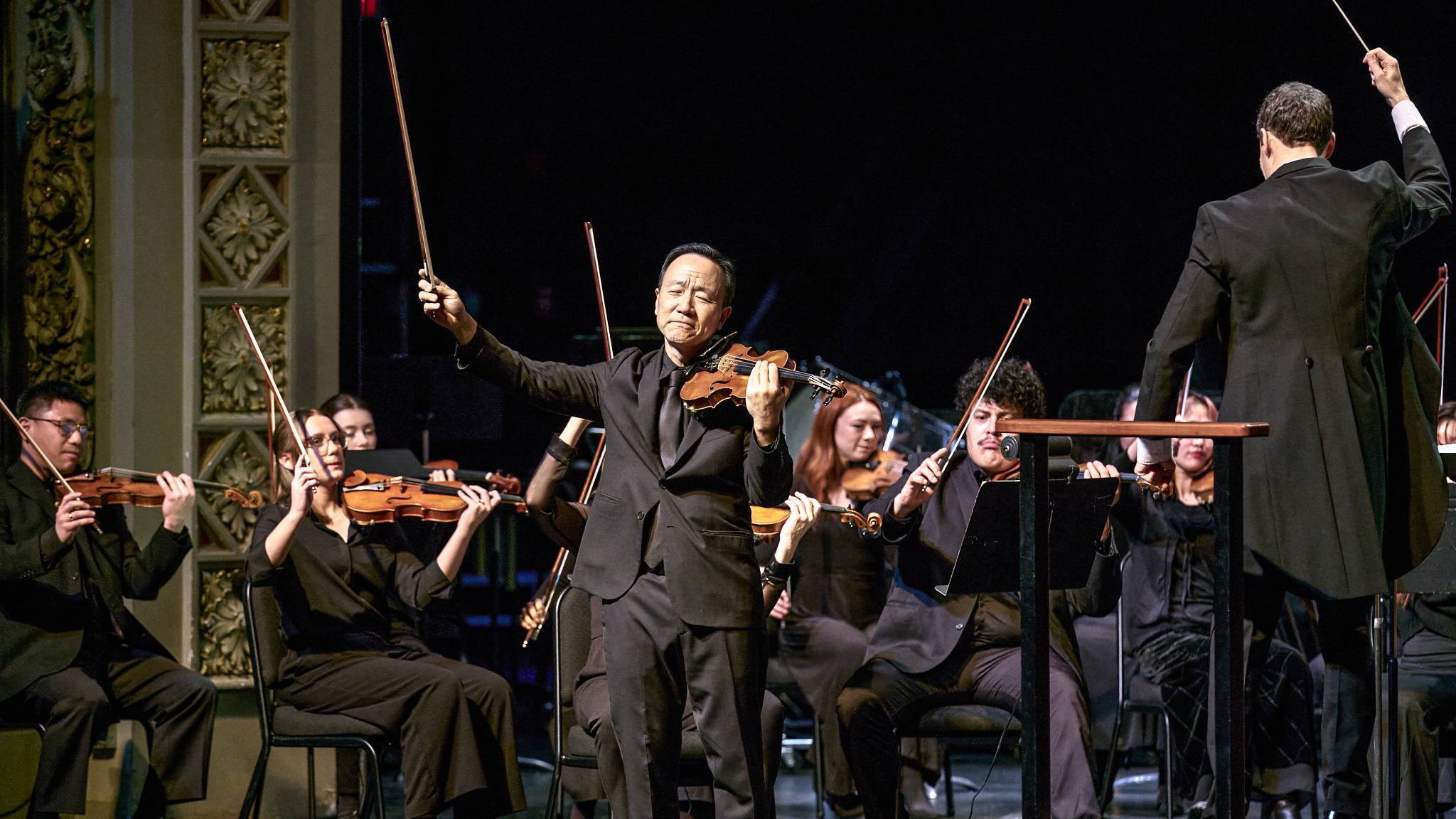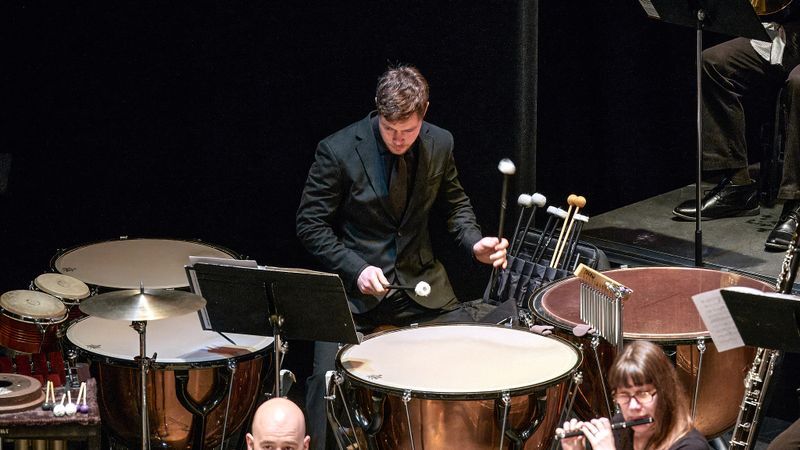Stringing Together Inspiration: Students Attend Gaelic Celebration Concert


On February 2, some students from YAMA, an after-school strings music program, had the incredible opportunity to attend the YSO's Gaelic Celebration concert, which featured Max Bruch's Scottish Fantasy with the renowned violinist David Kim. This memorable event was made possible through the donation of free student tickets, giving them the chance to experience live orchestral music at its finest with their friends and teachers. Prior to this field trip to the symphony, YAMA students also had the opportunity to connect with David Kim, learning about how he prepares to play epic solos in concertos like Scottish Fantasy and receiving feedback on their playing. Learn more about the Bruch piece at the bottom of this page with Horn Principal Jeffrey Snedeker's Program Notes!
Scottish Fantasy was a stunning highlight of the evening, and the students were particularly captivated by David Kim’s expressive performance. Not only was the music itself beautiful, but it was clear that Kim’s connection to the piece and the orchestra was something truly special. Prior to the concert, three YAMA students had the chance to interview David Kim over the phone as he drove over Snoqualmie Pass, and his insights added a personal touch to the experience.
He shared that prior to any given concert of this nature, one that so heavily features a virtuosic solo part, he plays the 35-minute piece for audiences daily in the week leading up for the performance, usually in nursing homes around Philadelphia. He explained he does so to get comfortable with playing while feeling nervous. He also endorsed the value of targeted practice—that practicing with smaller manageable goals in mind will provide better results than practicing without a plan. During Gaelic Celebration, students were able to witness the results of David Kim’s practice and talents, as his sound soared over the backdrop of the Yakima Symphony Orchestra’s accompaniment.
Many students were deeply moved by David Kim’s expressive playing. Beyond his technical skill, they were struck by the emotional depth he brought to Scottish Fantasy. Several students observed that, even when not playing, Kim seemed completely absorbed in the music. “When he isn’t playing, he seems to be in awe of the music,” one student noted, highlighting his genuine connection to the piece.
The students also marveled at how Kim used his body to express the emotions of the music. They noticed the subtle, yet powerful, movements that added intensity to his performance. Some mentioned his body language—how he would move his head with the music or shift his posture to enhance the musical phrases. “He moves his body in a way that makes the music feel alive,” shared another student.
Even some of the beginner students who have yet to learn more advanced techniques were able to discern what made Kim’s sound special. They noted his high-pitched notes had a joyful, almost uplifting quality to them, evoking happiness and excitement. It was clear to them that David Kim’s playing was not just about hitting the right notes, but about conveying feeling and meaning through each phrase.

When asked what kind of movie Scottish Fantasy would belong in, our students let their imaginations run wild. Some envisioned a coming-of-age story filled with adventure, while others pictured an action-packed movie starring none other than David Kim himself. One student creatively suggested a dramatic arc. The beginning movements would be one out of a fairy-tale or fantasy story; the second movement would host adventure or romance; the finale would feature victory. Another had a more whimsical take, imagining it as a cartoon! The diversity of responses showcases the emotional range and versatility of the piece, making it perfect for all kinds of cinematic storytelling.
While David Kim stole the show, many students were also captivated by other instruments in the orchestra throughout the program. Aside from Bruch’s Scottish Fantasy, Gaelic Celebration was rounded out by John William’s Suite from Far and Away and Amy Beach’s Gaelic Symphony. Concertmaster Denise Dillenbeck’s fiddle solo in the Williams drew special attention, while several students called out their favorite non-string instruments, with the clarinet, trumpet, timpani, and oboe all earning praise. One student’s favorite moment was the oboe solo in the 2nd movement of the Beach Symphony, while another loved the “drum-looking things” that added rhythm and intensity to the orchestra.

Students also noticed how the orchestra worked seamlessly together. They observed how the musicians stayed in sync by cueing each other and breathing together, “getting into the music” as one student put it. This cohesion allowed the symphony to come alive and made it even more impressive for the students.
This trip was more than just an evening at the symphony. It was an opportunity for students to connect with professional musicians and deepen their appreciation for the artistry behind the music they study. During intermission, YAMA students approached the stage to greet their current or past Teaching Artists who were playing with the Symphony during this concert. Several YSO musicians have worked with YAMA before, as Teaching Artists, guest conductors, or coaches. Our very own principal percussion, Joshua Gianola, was one of the founding members of YAMA in 2013, alongside current Executive Director Stephanie Hsu and Program Director Alex Pualani. YSO and YAMA are proud to be able to provide these kinds of enriching experiences that help foster a love for music and inspire students to continue pursuing their musical education.
Thank you to everyone who made this experience possible for our students, and to David Kim for sharing his talent and passion with us. We look forward to more events like this, where students can continue to learn, grow, and be inspired by the world of classical music.
—Ella Kim
German composer and conductor Max Bruch composed his first piece at nine and an opera at age twenty. He loved folk music as a source of melody, and several of his compositions have connections to music of other cultures. Composed in Berlin during the winter of 1879-1880, Scottish Fantasy was dedicated to virtuoso violinist Pablo de Sarasate. Though Bruch actually visited Scotland for the first time a year after the work was premiered, he had access to a collection of Scottish music at the Munich Library in the late 1860s, and he quotes several Scottish folk tunes in the piece.
The first movement begins ominously. The first theme is built on the folksong “Through the Wood Laddie.” The soloist is the focus of attention with the orchestra providing general support. This melody stays relatively intact throughout the movement, moving through a variety of harmonies and textures.
The second movement is built on the folksong “The Dusty Miller.” The tune is presented aggressively and then immediately elaborated, with virtuosic flourishes from the soloist and exciting interludes from the orchestra. After an impressive variety of moods and ornamented versions of the original melody, a surprising return of “Through the Wood Laddie” serves as a sentimental transition to the third movement.
The third movement begins with a quote of “I’m A’ Doun for Lack O’ Johnnie.” After the tune is presented by the soloist, a set of variations ensues with increasing range and numbers of notes. The contrasting middle section of the movement uses the second phrase of the folksong to expand the range of expression. The first part of the song returns, creating a musical bookend for the movement.
The fourth movement begins with a boisterous statement of “Hey Tuttie Tatie.” This folksong is then taken through many different harmonies and combinations of textures, with the soloist “improvising” with increasing intensity. Eventually, a calmer section is followed by flashy scales and arpeggios, a brief sentimental return to the first phrase of “Through the Wood Laddie,” and a final boisterous refrain of “Hey Tuttie Tatie.”
Bruch conducted the premiere with the Liverpool Philharmonic Society on February 22, 1881, with Joseph Joachim as soloist. Bruch was unhappy with Joachim’s performance, however, describing him as having “ruined” the work. Bruch conducted the work with Sarasate at a Philharmonic Society concert in St. James’s Hall on March 15, 1883. Scottish Fantasy is a signature piece by Bruch that is widely heard today.
—Jeffrey Snedeker